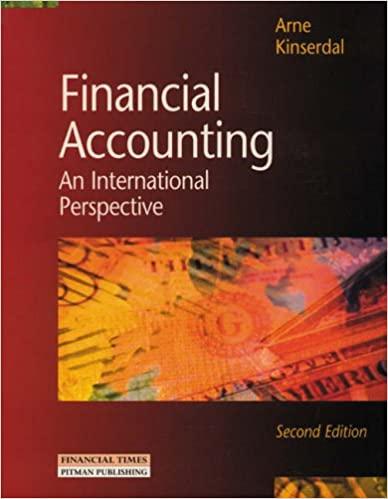Question
Problem 13-5A Comparative ratio analysis LO A1, P3 [The following information applies to the questions displayed below.] Summary information from the financial statements of two
Problem 13-5A Comparative ratio analysis LO A1, P3
[The following information applies to the questions displayed below.] Summary information from the financial statements of two companies competing in the same industry follows.
| Barco Company | Kyan Company | Barco Company | Kyan Company | |||||||||||
| Data from the current year-end balance sheets | Data from the current years income statement | |||||||||||||
| Assets | Sales | $ | 770,000 | $ | 880,200 | |||||||||
| Cash | $ | 19,500 | $ | 34,000 | Cost of goods sold | 585,100 | 632,500 | |||||||
| Accounts receivable, net | 37,400 | 57,400 | Interest expense | 7,900 | 13,000 | |||||||||
| Current notes receivable (trade) | 9,100 | 7,200 | Income tax expense | 14,800 | 24,300 | |||||||||
| Merchandise inventory | 84,440 | 132,500 | Net income | 162,200 | 210,400 | |||||||||
| Prepaid expenses | 5,000 | 6,950 | Basic earnings per share | 4.51 | 5.11 | |||||||||
| Plant assets, net | 290,000 | 304,400 | Cash dividends per share | 3.81 | 3.93 | |||||||||
| Total assets | $ | 445,440 | $ | 542,450 | ||||||||||
| Beginning-of-year balance sheet data | ||||||||||||||
| Liabilities and Equity | Accounts receivable, net | $ | 29,800 | $ | 54,200 | |||||||||
| Current liabilities | $ | 61,340 | $ | 93,300 | Current notes receivable (trade) | 0 | 0 | |||||||
| Long-term notes payable | 80,800 | 101,000 | Merchandise inventory | 55,600 | 107,400 | |||||||||
| Common stock, $5 par value | 180,000 | 206,000 | Total assets | 398,000 | 382,500 | |||||||||
| Retained earnings | 123,300 | 142,150 | Common stock, $5 par value | 180,000 | 206,000 | |||||||||
| Total liabilities and equity | $ | 445,440 | $ | 542,450 | Retained earnings | 98,300 | 93,600 | |||||||
Problem 13-5A Part 1
Required: 1a. For both companies compute the (a) current ratio, (b) acid-test ratio, (c) accounts (including notes) receivable turnover, (d) inventory turnover, (e) days' sales in inventory, and (f) days' sales uncollected. (Do not round intermediate calculations.) 1b. Identify the company you consider to be the better short-term credit risk.
Step by Step Solution
There are 3 Steps involved in it
Step: 1

Get Instant Access to Expert-Tailored Solutions
See step-by-step solutions with expert insights and AI powered tools for academic success
Step: 2

Step: 3

Ace Your Homework with AI
Get the answers you need in no time with our AI-driven, step-by-step assistance
Get Started


